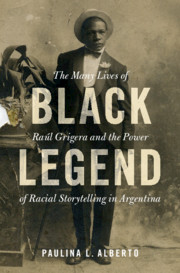Book contents
- Black Legend
- Black Legend
- Copyright page
- Dedication
- Contents
- Figures
- A Note on Terminology
- Introduction Racial Stories
- Chapter 1 Ancestors (1850–1880)
- Chapter 2 Community (1880–1900)
- Chapter 3 Youth (1900–1910)
- Chapter 4 Celebrity (1910–1916)
- Chapter 5 Defamation (1916–1930)
- Chapter 6 Deaths (1930–1955)
- Epilogue Afterlives (1955–Present)
- Acknowledgments
- Afro-Latin America
- Notes
- Bibliography
- Index
Chapter 3 - Youth (1900–1910)
Published online by Cambridge University Press: 06 January 2022
- Black Legend
- Black Legend
- Copyright page
- Dedication
- Contents
- Figures
- A Note on Terminology
- Introduction Racial Stories
- Chapter 1 Ancestors (1850–1880)
- Chapter 2 Community (1880–1900)
- Chapter 3 Youth (1900–1910)
- Chapter 4 Celebrity (1910–1916)
- Chapter 5 Defamation (1916–1930)
- Chapter 6 Deaths (1930–1955)
- Epilogue Afterlives (1955–Present)
- Acknowledgments
- Afro-Latin America
- Notes
- Bibliography
- Index
Summary
Later stories about Raúl, channeling racialized ideas about class, criminality, minority, mental illness, and malingering, suggested that Raúl, as a lower-class Black man, was all but fated to go astray. “Youth” situates the origins of those racialized ideas at the turn of the century, at the height of Argentina’s (overlooked) scientific racism and a broad panic about the “degeneracy” of the lower classes. It was precisely then that the young Raúl himself began his troubles with the law and was placed by his father in a reformatory for unruly boys for over a year (aged 19–21). By tracing Raúl’s experiences with the police, the army, the courts, and reformatory authorities who linked his “degeneracy” to his Blackness, this chapter illustrates how racial narratives, wielded by state and medical agents, began to circumscribe Raúl’s life. The chapter’s key argument is that Raúl’s experiences in this decade, after leaving his parents’ house but before achieving widespread fame, flesh out a key transition in Argentina’s racial narratives between the nineteenth and twentieth centuries: from marking difference primarily along lines of race, to marking difference along lines of class. His trajectory helps illustrate for the first time what it could have meant, in an embodied sense, for Afro-Argentines to “disappear” or amalgamate into a lower class of people racialized by a new, more diffuse form of blackness associated with poverty, marginality, or degeneration rather than strictly with African descent. This early twentieth-century shift in racial narratives in some ways defused the intensity of elites’ gaze upon Afrodescendants and Indigenous people, drawing it toward a wider contingent of lower classes. But the stain of African Blackness and accompanying prejudices did not go away; even as Argentina’s new racial narratives made room for some Afrodescendants to blend into Whiteness (as Raúl’s father, brother, and others did), they came down even more forcefully on people like Raúl who did not conform.
Keywords
- Type
- Chapter
- Information
- Black LegendThe Many Lives of Raúl Grigera and the Power of Racial Storytelling in Argentina, pp. 123 - 174Publisher: Cambridge University PressPrint publication year: 2022



